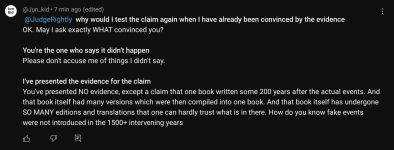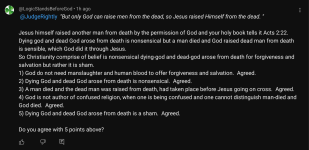Objective morality requires a source of that morality to be independent of human beings; In a purely materialistic and evolutionary worldview, the concept of objective morality—moral truths that exist independent of human opinion—collapses under its own weight. If all life is merely a different branch of the same evolutionary tree, then concepts like “right” and “wrong” are nothing more than arbitrary preferences, shaped by survival and social conditioning. Without a transcendent source, morality is just a human construct, no more real than a preference for chocolate over vanilla.
1. Evolutionary Morality is Subjective, Not Objective If morality evolved alongside human beings, then it is by definition changeable. What is considered “right” today could have been “wrong” a million years ago and might be different a million years from now. In an evolutionary framework, morality is merely what helped a species survive. But survival does not equate to moral truth. Lions kill their young in times of scarcity—does that mean infanticide is morally permissible? Certain ant species enslave other ants—does that mean slavery is morally acceptable? If morality is just a byproduct of evolution, then we have no grounds to condemn actions like murder, theft, or oppression beyond “it’s not beneficial for society,” which is a pragmatic argument, not a moral one.
2. Without a Higher Authority, Morality is Just Opinion If there is no God, then there is no ultimate standard beyond human consensus. This means that what is “right” or “wrong” is simply determined by culture, power, or personal preference. In Nazi Germany, genocide was legally and socially accepted—does that make it right? Without an objective moral standard, we have no basis to say that any act is truly evil or truly good; we can only say “I personally don’t like it” or “society currently disagrees.” But that’s not morality—that’s just preference.
3. Only a Transcendent Moral Lawgiver Can Establish Objective Morality For morality to be truly objective, it must come from a source beyond human opinion—a source that is unchanging, universal, and authoritative. This can only be God. If God exists, then morality is grounded in His nature, not in human evolution or social constructs. Murder is wrong not because society says so, but because it violates the moral law established by the Creator. Love, justice, and truth are real moral values because they are rooted in the eternal character of God, not in the shifting tides of human thought. Conclusion Objective morality cannot exist in a purely materialistic, evolutionary framework. If humans are just highly evolved animals, then our sense of right and wrong is no more significant than a chimpanzee’s social hierarchy or a pack of wolves enforcing dominance. But if morality is real—if some things are truly good and some things are truly evil—then there must be a higher moral standard that transcends human opinion. That standard can only come from God. Atheism and materialism ultimately lead to moral relativism, where nothing is truly good or evil. But deep down, we all know that some things—like torturing children for fun—are objectively wrong, no matter what anyone thinks. That knowledge points directly to the reality of God, because without Him, morality is nothing more than a meaningless illusion.


